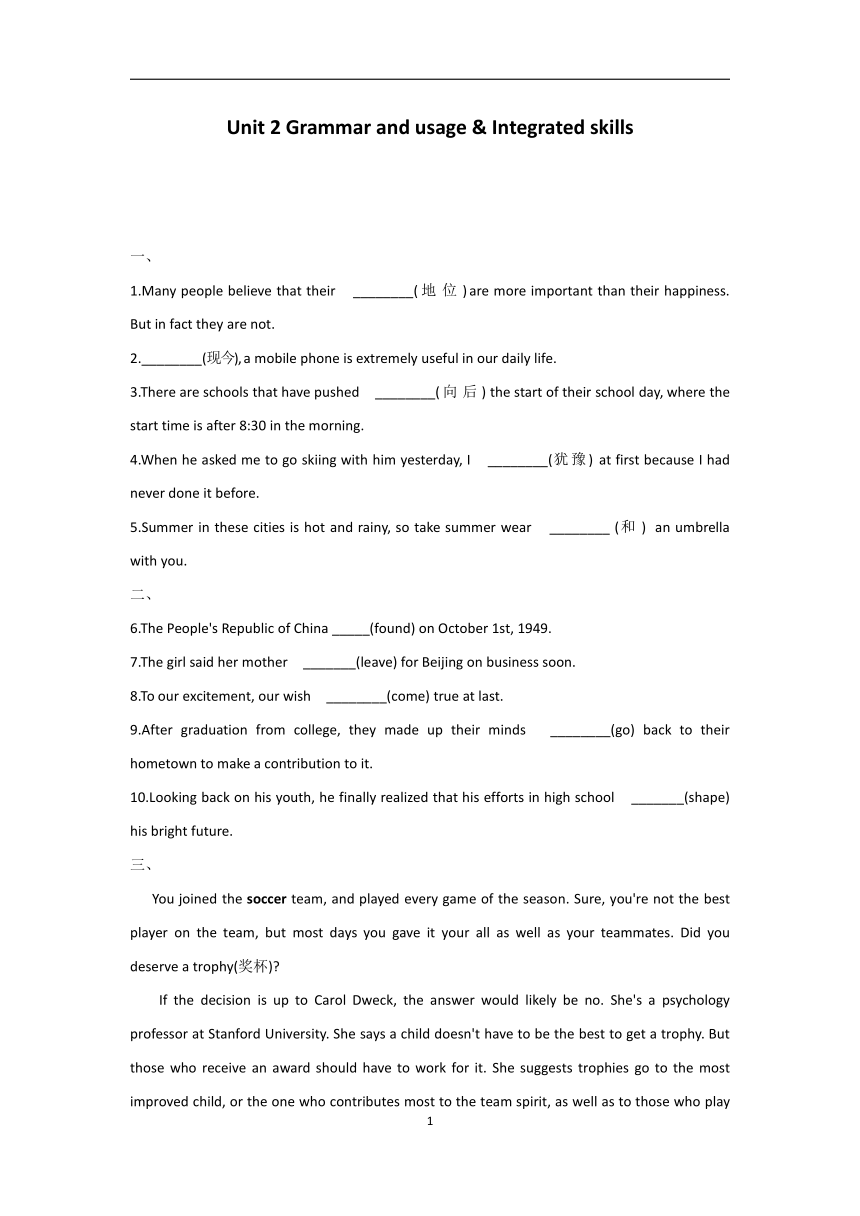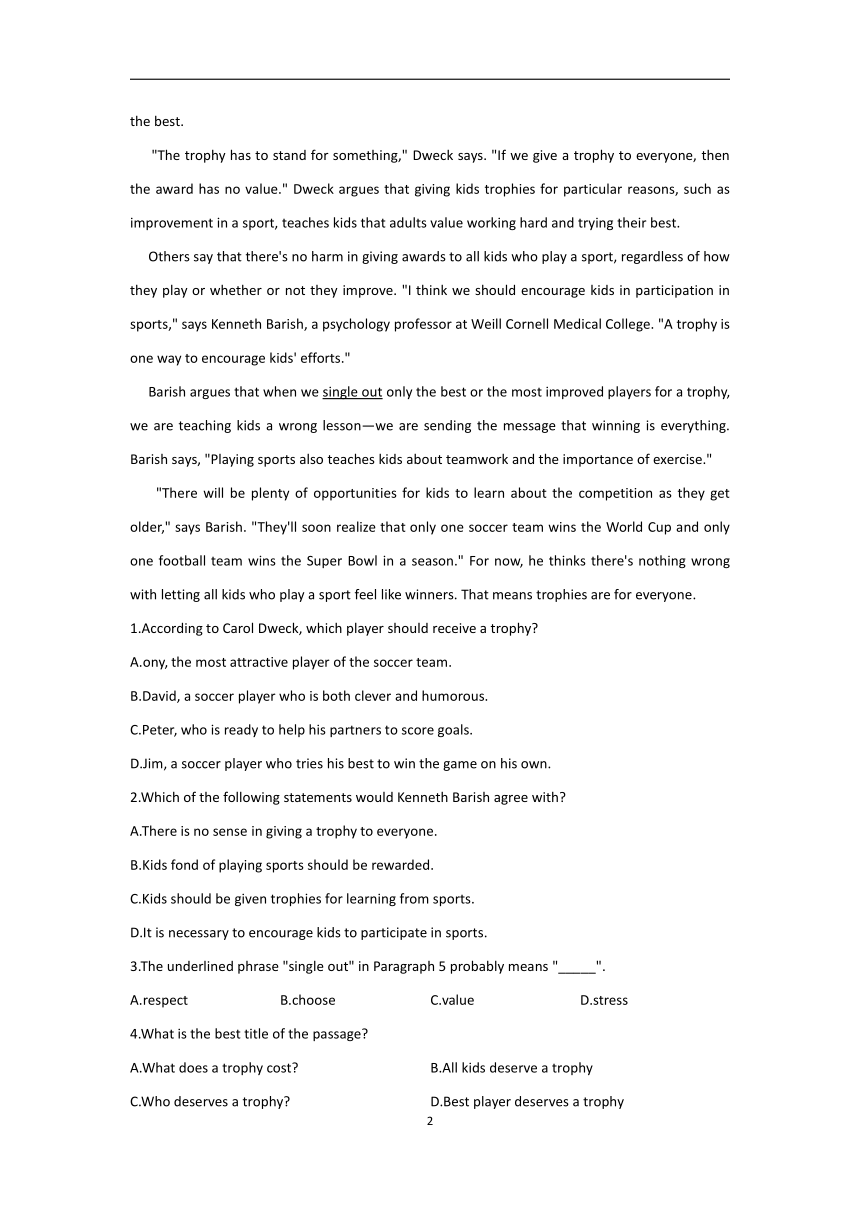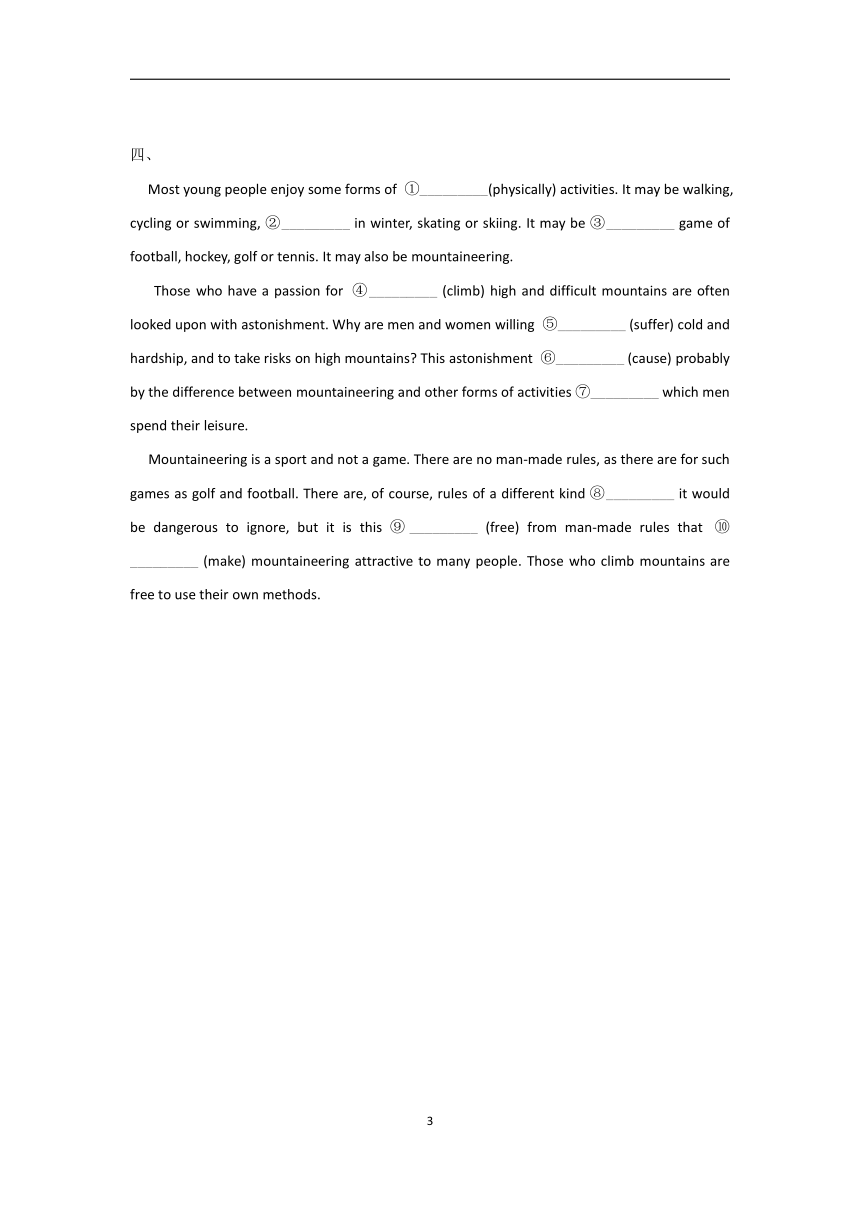牛津译林版(2019)必修 第二册Unit 2 Be sporty,be healthy Grammar and usage & Integrated skills课时练(含答案)
文档属性
| 名称 | 牛津译林版(2019)必修 第二册Unit 2 Be sporty,be healthy Grammar and usage & Integrated skills课时练(含答案) |  | |
| 格式 | docx | ||
| 文件大小 | 24.2KB | ||
| 资源类型 | 教案 | ||
| 版本资源 | 牛津译林版(2019) | ||
| 科目 | 英语 | ||
| 更新时间 | 2023-06-08 22:22:14 | ||
图片预览



文档简介
Unit 2 Grammar and usage & Integrated skills
一、
1.Many people believe that their ________(地位)are more important than their happiness. But in fact they are not.
2.________(现今), a mobile phone is extremely useful in our daily life.
3.There are schools that have pushed ________(向后) the start of their school day, where the start time is after 8:30 in the morning.
4.When he asked me to go skiing with him yesterday, I ________(犹豫) at first because I had never done it before.
5.Summer in these cities is hot and rainy, so take summer wear ________ (和) an umbrella with you.
二、
6.The People's Republic of China _____(found) on October 1st, 1949.
7.The girl said her mother _______(leave) for Beijing on business soon.
8.To our excitement, our wish ________(come) true at last.
9.After graduation from college, they made up their minds ________(go) back to their hometown to make a contribution to it.
10.Looking back on his youth, he finally realized that his efforts in high school _______(shape) his bright future.
三、
You joined the soccer team, and played every game of the season. Sure, you're not the best player on the team, but most days you gave it your all as well as your teammates. Did you deserve a trophy(奖杯)
If the decision is up to Carol Dweck, the answer would likely be no. She's a psychology professor at Stanford University. She says a child doesn't have to be the best to get a trophy. But those who receive an award should have to work for it. She suggests trophies go to the most improved child, or the one who contributes most to the team spirit, as well as to those who play the best.
"The trophy has to stand for something," Dweck says. "If we give a trophy to everyone, then the award has no value." Dweck argues that giving kids trophies for particular reasons, such as improvement in a sport, teaches kids that adults value working hard and trying their best.
Others say that there's no harm in giving awards to all kids who play a sport, regardless of how they play or whether or not they improve. "I think we should encourage kids in participation in sports," says Kenneth Barish, a psychology professor at Weill Cornell Medical College. "A trophy is one way to encourage kids' efforts."
Barish argues that when we single out only the best or the most improved players for a trophy, we are teaching kids a wrong lesson—we are sending the message that winning is everything. Barish says, "Playing sports also teaches kids about teamwork and the importance of exercise."
"There will be plenty of opportunities for kids to learn about the competition as they get older," says Barish. "They'll soon realize that only one soccer team wins the World Cup and only one football team wins the Super Bowl in a season." For now, he thinks there's nothing wrong with letting all kids who play a sport feel like winners. That means trophies are for everyone.
1.According to Carol Dweck, which player should receive a trophy
A.ony, the most attractive player of the soccer team.
B.David, a soccer player who is both clever and humorous.
C.Peter, who is ready to help his partners to score goals.
D.Jim, a soccer player who tries his best to win the game on his own.
2.Which of the following statements would Kenneth Barish agree with
A.There is no sense in giving a trophy to everyone.
B.Kids fond of playing sports should be rewarded.
C.Kids should be given trophies for learning from sports.
D.It is necessary to encourage kids to participate in sports.
3.The underlined phrase "single out" in Paragraph 5 probably means "_____".
A.respect B.choose C.value D.stress
4.What is the best title of the passage
A.What does a trophy cost B.All kids deserve a trophy
C.Who deserves a trophy D.Best player deserves a trophy
四、
Most young people enjoy some forms of ①_________(physically) activities. It may be walking, cycling or swimming, ②_________ in winter, skating or skiing. It may be ③_________ game of football, hockey, golf or tennis. It may also be mountaineering.
Those who have a passion for ④_________ (climb) high and difficult mountains are often looked upon with astonishment. Why are men and women willing ⑤_________ (suffer) cold and hardship, and to take risks on high mountains This astonishment ⑥_________ (cause) probably by the difference between mountaineering and other forms of activities ⑦_________ which men spend their leisure.
Mountaineering is a sport and not a game. There are no man-made rules, as there are for such games as golf and football. There are, of course, rules of a different kind ⑧_________ it would be dangerous to ignore, but it is this ⑨_________ (free) from man-made rules that ⑩_________ (make) mountaineering attractive to many people. Those who climb mountains are free to use their own methods.
答案以及解析
一、
1.答案:positions
解析:句意:很多人都认为,他们的地位比幸福更重要。但实际上不是。由空后的are可知此处用名词复数。
2.答案:Nowadays
解析:句意:现今,手机在我们日常生活中极其有用。nowadays现今,现在。
3.答案:backward(s)
解析:句意:有些学校已经推迟了上课时间,它们早晨八点半之后开始上课。backward(s)向后;朝反方向。
4.答案:hesitated
解析:句意:当他昨天叫我跟他一起去滑雪时,起初我犹豫了,因为我以前从没有滑过雪。hesitate犹豫。由句意可知,此处用一般过去时。
5.答案:plus/and
解析:句意:在这些城市夏天既热又多雨,所以你要带上夏天穿的衣服和一把伞。plus加,以及,和;and和,又,同。
二、
6.答案:was founded
解析:句意: 中华人民共和国于1949年10月1日成立。主语与谓语动词是被动关系, 由时间状语可知此处为一般过去时, 故填was founded。
7.答案:was leaving
解析: go,come,leave,take off等少数动词(短语)可以用过去进行时表示过去将要发生的情况,故填was leaving。
8.答案:came
解析:考查时态。come true"实现",其中come为系动词,意为"变成",没有被动语态。结合句意可知,此处表示过去发生的动作,故用一般过去时。
9.答案:to go
解析:考查固定用法。make up one's mind to do sth是固定用法,表示"下定决心做某事",故此处应填to go。
10.答案:were to shape
解析: was/were to do可以表示"后来结果,注定"的含义。根据句意可知,此处应填were to shape。
三、
答案:1-4 CDBC
解析:1.根据第二段中的"She suggests trophies go to the most improved child, or the one who contributes most to the team spirit, as well as to those who play the best"可知, Carol Dweck认为, 进步最大的或对团队精神贡献最多的孩子和表现最佳的孩子一样都应获奖。C项中的Peter十分具有团队精神, 其他几人都不符合以上条件。故选C。
2.根据第四段中的"I think we should encourage kids in participation in sports"可知, Kenneth Barish认为我们应该鼓励孩子参加体育活动。故选D。
3.根据画线短语所在句可知, Kenneth Barish认为, 当我们只挑选出最佳球员或进步最大的球员并授予他们奖杯的时候, 我们在给孩子们传达一个错误的信息: 获胜就是一切。因此可推知single out意为"挑出"。故选B。
4.通读全文可知, 本文主要讨论了是否每个参加体育比赛的孩子都该得到奖杯, 并就这个问题给出了两种不同的看法。A项与文章无关; B项和D项各是看法之一; C项是本文讨论的问题。故选C。
四、
答案:physical ; or; a; climbing; to suffer ; is caused; on; that/which; freedom; makes
解析:这是一篇说明文。文章介绍了为什么人们喜欢登山。
①考查词性转换。名词activities前面应用形容词作定语,故填physical。
②考查连词。句意:大多数年轻人喜欢体育运动。可能是散步、骑车、游泳,或是在冬天滑冰、滑雪。由句意可知,此处表示选择关系,故填or。
③考查冠词。此处泛指一次比赛活动,用不定冠词。故填a。
④考查非谓语动词。介词for后用动名词。故填climbing。
⑤考查非谓语动词。be willing to do sth.愿意做某事。
⑥考查语态。主句主语是astonishment(惊讶),与cause是被动关系,因而用被动语态。故填is caused。
⑦考查介词。spend...on在……方面花……,在……上花费……。故填on。
⑧考查定语从句。设空处引导定语从句,修饰rules of a different kind。关系代词that/which作不定式to ignore的宾语。
⑨考查词性转换。此处作分句主语,应用名词,故填名词freedom。
⑩考查主谓一致。分句主语是单数名词freedom,故填第三人称单数形式makes。
2
一、
1.Many people believe that their ________(地位)are more important than their happiness. But in fact they are not.
2.________(现今), a mobile phone is extremely useful in our daily life.
3.There are schools that have pushed ________(向后) the start of their school day, where the start time is after 8:30 in the morning.
4.When he asked me to go skiing with him yesterday, I ________(犹豫) at first because I had never done it before.
5.Summer in these cities is hot and rainy, so take summer wear ________ (和) an umbrella with you.
二、
6.The People's Republic of China _____(found) on October 1st, 1949.
7.The girl said her mother _______(leave) for Beijing on business soon.
8.To our excitement, our wish ________(come) true at last.
9.After graduation from college, they made up their minds ________(go) back to their hometown to make a contribution to it.
10.Looking back on his youth, he finally realized that his efforts in high school _______(shape) his bright future.
三、
You joined the soccer team, and played every game of the season. Sure, you're not the best player on the team, but most days you gave it your all as well as your teammates. Did you deserve a trophy(奖杯)
If the decision is up to Carol Dweck, the answer would likely be no. She's a psychology professor at Stanford University. She says a child doesn't have to be the best to get a trophy. But those who receive an award should have to work for it. She suggests trophies go to the most improved child, or the one who contributes most to the team spirit, as well as to those who play the best.
"The trophy has to stand for something," Dweck says. "If we give a trophy to everyone, then the award has no value." Dweck argues that giving kids trophies for particular reasons, such as improvement in a sport, teaches kids that adults value working hard and trying their best.
Others say that there's no harm in giving awards to all kids who play a sport, regardless of how they play or whether or not they improve. "I think we should encourage kids in participation in sports," says Kenneth Barish, a psychology professor at Weill Cornell Medical College. "A trophy is one way to encourage kids' efforts."
Barish argues that when we single out only the best or the most improved players for a trophy, we are teaching kids a wrong lesson—we are sending the message that winning is everything. Barish says, "Playing sports also teaches kids about teamwork and the importance of exercise."
"There will be plenty of opportunities for kids to learn about the competition as they get older," says Barish. "They'll soon realize that only one soccer team wins the World Cup and only one football team wins the Super Bowl in a season." For now, he thinks there's nothing wrong with letting all kids who play a sport feel like winners. That means trophies are for everyone.
1.According to Carol Dweck, which player should receive a trophy
A.ony, the most attractive player of the soccer team.
B.David, a soccer player who is both clever and humorous.
C.Peter, who is ready to help his partners to score goals.
D.Jim, a soccer player who tries his best to win the game on his own.
2.Which of the following statements would Kenneth Barish agree with
A.There is no sense in giving a trophy to everyone.
B.Kids fond of playing sports should be rewarded.
C.Kids should be given trophies for learning from sports.
D.It is necessary to encourage kids to participate in sports.
3.The underlined phrase "single out" in Paragraph 5 probably means "_____".
A.respect B.choose C.value D.stress
4.What is the best title of the passage
A.What does a trophy cost B.All kids deserve a trophy
C.Who deserves a trophy D.Best player deserves a trophy
四、
Most young people enjoy some forms of ①_________(physically) activities. It may be walking, cycling or swimming, ②_________ in winter, skating or skiing. It may be ③_________ game of football, hockey, golf or tennis. It may also be mountaineering.
Those who have a passion for ④_________ (climb) high and difficult mountains are often looked upon with astonishment. Why are men and women willing ⑤_________ (suffer) cold and hardship, and to take risks on high mountains This astonishment ⑥_________ (cause) probably by the difference between mountaineering and other forms of activities ⑦_________ which men spend their leisure.
Mountaineering is a sport and not a game. There are no man-made rules, as there are for such games as golf and football. There are, of course, rules of a different kind ⑧_________ it would be dangerous to ignore, but it is this ⑨_________ (free) from man-made rules that ⑩_________ (make) mountaineering attractive to many people. Those who climb mountains are free to use their own methods.
答案以及解析
一、
1.答案:positions
解析:句意:很多人都认为,他们的地位比幸福更重要。但实际上不是。由空后的are可知此处用名词复数。
2.答案:Nowadays
解析:句意:现今,手机在我们日常生活中极其有用。nowadays现今,现在。
3.答案:backward(s)
解析:句意:有些学校已经推迟了上课时间,它们早晨八点半之后开始上课。backward(s)向后;朝反方向。
4.答案:hesitated
解析:句意:当他昨天叫我跟他一起去滑雪时,起初我犹豫了,因为我以前从没有滑过雪。hesitate犹豫。由句意可知,此处用一般过去时。
5.答案:plus/and
解析:句意:在这些城市夏天既热又多雨,所以你要带上夏天穿的衣服和一把伞。plus加,以及,和;and和,又,同。
二、
6.答案:was founded
解析:句意: 中华人民共和国于1949年10月1日成立。主语与谓语动词是被动关系, 由时间状语可知此处为一般过去时, 故填was founded。
7.答案:was leaving
解析: go,come,leave,take off等少数动词(短语)可以用过去进行时表示过去将要发生的情况,故填was leaving。
8.答案:came
解析:考查时态。come true"实现",其中come为系动词,意为"变成",没有被动语态。结合句意可知,此处表示过去发生的动作,故用一般过去时。
9.答案:to go
解析:考查固定用法。make up one's mind to do sth是固定用法,表示"下定决心做某事",故此处应填to go。
10.答案:were to shape
解析: was/were to do可以表示"后来结果,注定"的含义。根据句意可知,此处应填were to shape。
三、
答案:1-4 CDBC
解析:1.根据第二段中的"She suggests trophies go to the most improved child, or the one who contributes most to the team spirit, as well as to those who play the best"可知, Carol Dweck认为, 进步最大的或对团队精神贡献最多的孩子和表现最佳的孩子一样都应获奖。C项中的Peter十分具有团队精神, 其他几人都不符合以上条件。故选C。
2.根据第四段中的"I think we should encourage kids in participation in sports"可知, Kenneth Barish认为我们应该鼓励孩子参加体育活动。故选D。
3.根据画线短语所在句可知, Kenneth Barish认为, 当我们只挑选出最佳球员或进步最大的球员并授予他们奖杯的时候, 我们在给孩子们传达一个错误的信息: 获胜就是一切。因此可推知single out意为"挑出"。故选B。
4.通读全文可知, 本文主要讨论了是否每个参加体育比赛的孩子都该得到奖杯, 并就这个问题给出了两种不同的看法。A项与文章无关; B项和D项各是看法之一; C项是本文讨论的问题。故选C。
四、
答案:physical ; or; a; climbing; to suffer ; is caused; on; that/which; freedom; makes
解析:这是一篇说明文。文章介绍了为什么人们喜欢登山。
①考查词性转换。名词activities前面应用形容词作定语,故填physical。
②考查连词。句意:大多数年轻人喜欢体育运动。可能是散步、骑车、游泳,或是在冬天滑冰、滑雪。由句意可知,此处表示选择关系,故填or。
③考查冠词。此处泛指一次比赛活动,用不定冠词。故填a。
④考查非谓语动词。介词for后用动名词。故填climbing。
⑤考查非谓语动词。be willing to do sth.愿意做某事。
⑥考查语态。主句主语是astonishment(惊讶),与cause是被动关系,因而用被动语态。故填is caused。
⑦考查介词。spend...on在……方面花……,在……上花费……。故填on。
⑧考查定语从句。设空处引导定语从句,修饰rules of a different kind。关系代词that/which作不定式to ignore的宾语。
⑨考查词性转换。此处作分句主语,应用名词,故填名词freedom。
⑩考查主谓一致。分句主语是单数名词freedom,故填第三人称单数形式makes。
2
